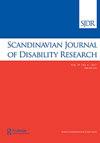Research Methods and Practices of Doing Disability Studies in the Global South
IF 1.3
Q2 REHABILITATION
引用次数: 2
Abstract
Disability studies has long been based primarily on theories and practices in the global North also in the Scandinavian Journal of Disability Research. Today there is an increase in disability research conducted in the global South. Yet, many studies continue to frame data using already existing concepts, debates and research strategies from the global North, focusing less on building theory situated in the global South. The reliance on theories developed in the global North may reinforce the epistemic vulnerability of disability studies in the global South. As disability studies as a whole is concerned with the politics of voice, in this special section, therefore, we explicitly aimed at triggering critical discussion on how to develop research methods and practices in contexts outside the global North. The four papers in this section challenge us and our epistemological and methodological norms towards more nuanced approaches in each research context. The lessons to be learned from these papers go beyond issues in the global South. The great heterogeneity of disability and its contexts, as well as its evolving nature, mean that we must all think deeply about interconnectedness, relationality, and continuity of disability with other phenomenon across different time and space. The global perspective to disability simultaneously teaches us the global structures of inequalities beyond country borders.发展中国家残疾研究的研究方法与实践
长期以来,残疾研究主要基于全球北方的理论和实践,斯堪的纳维亚残疾研究杂志也是如此。今天,在全球发展中国家进行的残疾研究有所增加。然而,许多研究继续使用来自全球北方的现有概念、辩论和研究策略来构建数据,而较少关注建立位于全球南方的理论。对发达国家发展的理论的依赖可能会加强发展中国家残疾研究在认知上的脆弱性。由于残疾研究作为一个整体是与声音政治有关的,因此,在这个特殊的部分中,我们明确地旨在引发关于如何在全球北方以外的背景下发展研究方法和实践的批判性讨论。本节的四篇论文挑战了我们和我们的认识论和方法论规范,在每个研究背景下都采用更细致入微的方法。从这些文件中吸取的教训超出了全球发展中国家的问题。残疾及其背景的巨大异质性及其不断演变的性质意味着,我们都必须深入思考残疾与不同时间和空间的其他现象之间的相互联系、关系和连续性。同时,从全球角度看待残疾问题也让我们了解了超越国界的全球不平等结构。
本文章由计算机程序翻译,如有差异,请以英文原文为准。
求助全文
约1分钟内获得全文
求助全文
来源期刊

Scandinavian Journal of Disability Research
REHABILITATION-
CiteScore
3.20
自引率
0.00%
发文量
13
审稿时长
16 weeks
 求助内容:
求助内容: 应助结果提醒方式:
应助结果提醒方式:


